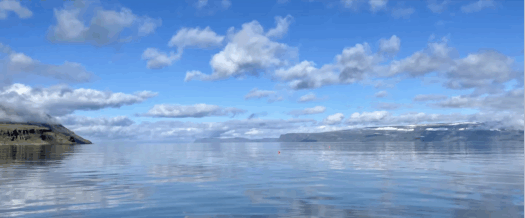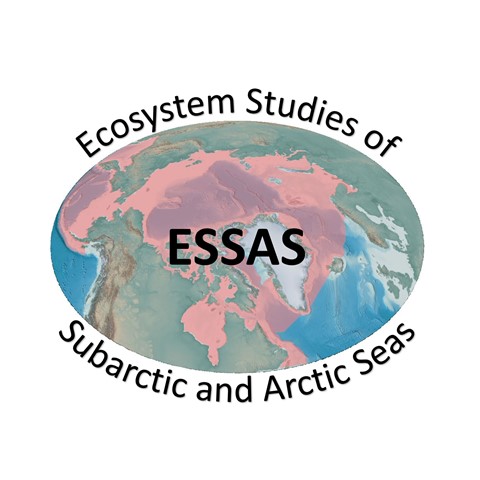-
ESSAS Annual Science Meeting 2026 in Reykjavik, Iceland (Registration and Abstract Submission Now Open)
2026 Annual Science Meeting
Borealization: Subarctic and Arctic Marine Systems in Transition

Dates: 23-25 June, 2026
Location: Reykjavík, Iceland
Registration and abstract submission: https://english.hi.is/conference/essas-2026
Registration and abstract submission for ESSAS 2026 are now open, with abstracts due February 15, 2026. Because June is a busy month in Reykjavík, we encourage booking accommodations early.
[26.08.25]read more -
2025 Ecosystem Studies of the Subarctic and Arctic Seas (ESSAS) Open Science Meeting
2025 ESSAS Open Science Meeting: Past, Present and Future of Marine Biodiversity and Ecosystems

For session descriptions, see below!
Date: June 24-26, 2025
Venue & Location: National Institute of Polar Research, Tachikawa, Tokyo, Japan
Registration: https://essas.confit.atlas.jp/login
Conference Program:
(1) Conference Program without Abstract for Printing
(2) Conference Program with Abstract for Online View (Registration information required to view the abstracts)
Accommodations:
No block accommodation is booked, so please find and reserve a hotel by yourself. We suggest that hotels near JR Tachikawa Station would be convenient to commute to the meeting venue, the National Institute of Polar Research (access information).
There are many hotels near Tachikawa Station, but please make your reservation early. Please check the prices offered by the hotels carefully because Japanese hotel costs are often charged per person, not per room. Below is the example list of the hotels near Tachikawa Station (generally ranked by the prices):
– Toyoko-Inn Tachikawa-eki Kita-guchi
Banquet: The meeting banquet will be held at Hotel Emisia, Tokyo, Tachikawa on the evening of June 25th
[16.07.24]read more -
2024 ESSAS Annual Science Meeting in St. John’s, Newfoundland, Canada (Abstract submissions are due: April 8, 2024)
2024 ESSAS Annual Science Meeting: “Exploring the dynamic interface of human and marine life in high-latitude coastal zones”

Dates: June 18-21, 2024
[26.06.23]read more -
2023 ESSAS Annual Science Meeting in Bergen, Norway (Conference Program uploaded)
2023 ESSAS Annual Science Meeting: “Ecological, social and economic dynamics of high-latitude coastal systems”

Dates: June 20-22, 2023
[10.01.23]read more -
PESAS Special Issue in Quaternary Research
ESSAS is pleased to announce the publication of a special issue of the journal Quaternary Research (v. 108) dedicated to research of the ESSAS working group “Paleoecology of Subarctic and Arctic Seas” (PESAS).
[10.08.22]read more -
2022 ESSAS Annual Science Meeting in Seattle, Washington (Final updates)
2022 Ecosystem Studies of the Subarctic and Arctic Seas (ESSAS) Annual Science Meeting: “Bridging the past and present to manage the future of northern fisheries and ecosystems”
All registered participants will receive a Zoom link no later than Friday, June 17
[28.01.22]read more -
Opportunity for Early Career Scientists to join ESSAS steering committee
If you are interested in the impacts of climate change on high-latitude marine ecosystems, this is your opportunity to help shape the future of the Ecosystem Studies of the Subarctic and Arctic Seas (ESSAS) program.
ESSAS is a regional program under the Integrated Marine Biosphere Research (IMBeR) project and is inviting nominations for an Early Career Scientist (within 6 years of PhD completion, excluding any periods of leave) to join its Scientific Steering Committee (SSC) for a three-year renewable term. The SSC is responsible for the development, planning and implementation of science with the goal to “compare, quantify and predict the impact of climate variability on the productivity and sustainability of Subarctic and Arctic marine ecosystems.
[30.07.21]read more -
2021 ESSAS Webinar Annual Science Meeting in Sapporo, Japan 30 May–4 June, 2021 (Abstract submission extended)
“Linking past and present marine ecosystems to inform future fisheries and aquaculture”
Webinar at http://xxxxxxx (to be announced)
Host of webinar, Arctic Research Center, Hokkaido University
Date: 30 May – 4 June, 2021[24.09.20]read more -
ESSAS 2020 cancelled due to COVID-19
Dear all submitters of abstract and participants of ESSAS ASM 2020,
We regret to inform all of you that the ESSAS Annual Science Meeting (ASM) 2020, scheduled on 31 May-5 June 2020 in Sapporo, Japan, is canceled as a proactive measure against the novel coronavirus (COVID-19) situation in Japan and foreign countries.
[19.03.20]read more -
ESSAS session and workshop on high-latitude ecosystems
The Ecosystem Studies of Subarctic and Arctic Seas (ESSAS) program will be organizing a session on ‘’Arctic marine ecosystems in a changing climate’’ and a workshop on the ‘’ Bioenergetics and survival trajectories of Arctic fish in response to environmental stressors’’ as part of the Integrated Marine Biosphere Research project (IMBeR) Open Science Conference Future Oceans2: ocean sustainability for the benefit of society: understanding, challenges, and solutions to be held at Le Quartz Congress Centre in Brest, France, June 17-21, 2019.
[21.11.18]read more











